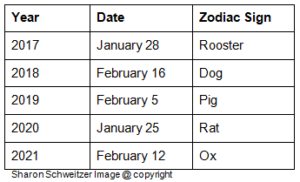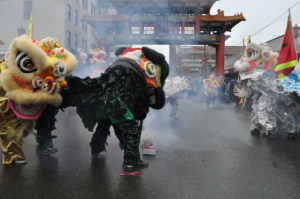Xīnnián kuàilè! Happy Chinese New Year! While most Western countries ring in New Year’s Day at midnight on January 1, many of our Asian neighbors will celebrate New Year’s on January 28th, 2017, the Year of the Rooster. Brunei, China, Hong Kong, Indonesia, Macau, Malaysia, the Philippines, Singapore, South Korea, Taiwan, and Vietnam observe the New Year as a public holiday. Communities worldwide start of the lunar calendar year with great anticipation and excitement. As an cross-cultural business expert and author of the best-selling book Access to Asia, I’m providing questions and answers about how Chinese New Year varies from Gregorian calendar New Year and how to avoid etiquette faux pas: When exactly is Chinese New Year? Does it fall on the same day every year? The 2017 Chinese New Year will be celebrated on Saturday, January 28, 2017. Each year the celebration date is based upon the Chinese lunar calendar, not the Western Gregorian calendar, causing the holiday to fall on a different day each year between January 21 and February 20. The dates for the next five Chinese New Years are included in the chart below. Why is Chinese New Year traditionally celebrated? Like many cultures, the new year in China and several other Asian countries signifies a fresh start. Families and friends gather together for joyous celebrations after a year of hard work. Historically, the new year marked a new farming season, and families wished for a plentiful harvest. In today’s society, this tradition commemorates a new business year with hopes for prosperity and success. How do Asian communities celebrate this holiday? Although celebrations vary between regions and countries, the main traditions include an intergenerational feast with family, firecrackers, and red clothing symbolizing luck and prosperity. Many Chinese cities, like Beijing host huge festivals with dragon and lion dances, fireworks, and street performances; rural areas observe traditional activities such as ancestor worship. What should I give my friends or coworkers celebrating this holiday? The traditional gift for Chinese New Year is a red money packet containing an even number of bills. Gifts of peach blossoms symbolize lasting relationships, pineapple, or bamboo represents prosperity, and bottle gourds signify longevity and wealth. Research the lucky numbers of each country For example, in China, consider giving items in even numbers, except for four. Eight is the luckiest number in Chinese culture, so a set of eight items would be greatly appreciated by the recipients. What cultural taboos surround Chinese New Year? The Chinese have several superstitions which apply up to a month before the holiday and continue until the Lantern Festival, which falls on the 15th day of the New Year. Things to avoid include washing hair the first three days of the year, which rinses away good luck. Keep distance from begging and crying children (console them fastidiously) to avoid unwanted bad luck. Gifts to avoid? Avoid giving any sharp objects such as scissors, kitchen utensils or brooches, shoes, umbrellas, clocks, cut flowers, black or white objects, mirrors, and cut flowers as gifts. Also refrain from giving items in groups of four, which is associated with death and is therefore an unlucky number. Happy Chinese New Year! Stay tuned for our upcoming blog on Chinese New Year’s Myths and Legends! Sharon Schweitzer, J.D., is a cross-cultural trainer, an international protocol expert and the founder of Protocol & Etiquette Worldwide. In addition to her accreditation in intercultural management with the HOFSTEDE center, she serves as a Chinese Ceremonial and Banquet Dining Etiquette Specialist in the documentary series Confucius was a Foodie, on Nat Geo People and NTD Television Canada. She is the resident etiquette expert for popular morning lifestyle shows: ABC Tampa Bay’s Morning Blend and CBS Austin’s We Are Austin. She is regularly quoted by BBC Capital, Investor’s Business Daily, Fortune, National Business Journal, Reader’s Digest and Stylecaster. Her international award-winning, best-selling book Access to Asia: Your Multicultural Business Guide, now in its second printing, was named to Kirkus Reviews’ Best Books of 2015. Sharon is the winner of the British Airways International Trade, Investment & Expansion Award at the 2016 Greater Austin Business Awards.


Sharon, coming from my Chinese friend Susie Lee who I sent your article; She was very impressed how accurate and insightful it was. Thank you for this informative article about the richness of the Chinese culture.